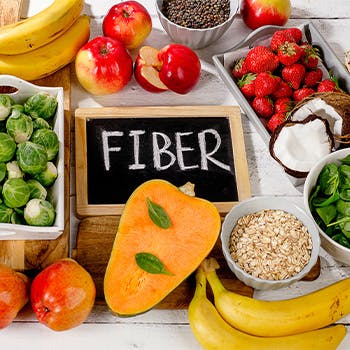Can a High Fiber Diet Help Hemorrhoids?

You’ve probably been told that fiber is an important part of your diet. You may have also heard that upping your fiber intake is an important lifestyle change that can manage, or even decrease the frequency your hemorrhoid flare-ups. It’s important to understand how a high fiber diet can help with hemorrhoids.
What is Dietary Fiber?
Fiber is found primarily in fruits, vegetables, legumes and whole grains. Also known as roughage or bulk, it is comprised of the parts of plant-based foods that cannot be digested or absorbed by the body.1 The digestive system is able to break down other components of what you eat, like fats and carbohydrates, but this isn’t the case with fiber.1 Instead it passes through your body and is expelled in a relatively intact state when you have a bowel movement.1
There are two main kinds of fiber, soluble and insoluble.1
- Soluble fiber can dissolve in water and forms a gel-type consistency. This kind of fiber can lower your blood pressure and is typically found in foods like beans, apples, carrots, oats and citrus fruits.1
- Insoluble fiber does not dissolve in water and cannot be digested by the body, so it adds bulk to bowel movements.1 This bulk is necessary to encourage the wave-liked contractions that move waste material through the intestine.2 It is found in foods like whole wheat flour, green beans, cauliflower and potatoes.1
How Does a High Fiber Diet Help Hemorrhoids?
Maintaining a hemorrhoid diet that’s high in fiber can help you in a few ways:
- Maintain bowel health. A high fiber diet can actually prevent hemorrhoids.1 It can also help prevent other intestinal issues like diverticulitis and may even lower the risk of colon cancer.1
- Regulate bowel movements. If the foods you eat have enough fiber in them, your stool should pass easily.1 As the undigested insoluble fiber makes its way through your digestive system, it absorbs water while it’s in the intestine, making it softer and reducing the need to strain during a bowel movement.2 Eating lots of fiber and drinking lots of water will lower your risk of constipation and make bathroom trips easier, since your stool will pass through your colon with ease.1,2
How to Get More Fiber in your Diet
Decrease the risk of developing hemorrhoids by making adjustments to your eating habits and upping your water intake. Here are some things to keep in mind in regard to food labels when grocery shopping with your hemorrhoid health in mind:
- A food can be considered a “good source of fiber” if it delivers 10% of the daily recommended dose of fiber, which is about 2.5 grams per serving.3
- Something that is “rich in,” “an excellent source of,” or “high in” fiber should contain 5 or more grams of fiber in each serving.3
Look for the words “100% whole wheat” or “100% whole grain” when buying bread and cereals with at least 6 grams of fiber per serving.3 If you’re looking to add other high fiber foods to your cart, raisins and peanuts are both high and fiber and are great for snacking.3 Buy apples and pears but leave the skin on for 4-6 grams of fiber per piece of fruit.3 Opt for brown rice and veggies like green beans and broccoli alongside lean protein for an easy dinner that won’t aggravate your hemorrhoids.3
While a diet that’s high in fiber can help prevent new hemorrhoids, it can’t effectively erase any existing hemorrhoids. If flare-ups are getting you down, reach for your favorite Preparation H product, like Soothing Relief Cleaning & Cooling Wipes.


